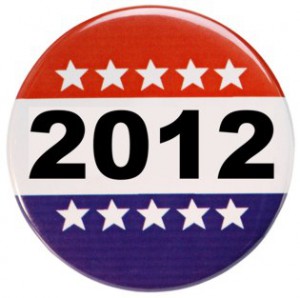Religion and the

By Brian Magee
Revealing details about how various segments of the U.S. population consider religion when it comes to voting, a panel put together by the Center for American Progress recently took up the topic “God and Politics: Examining Religion in the 2012 Election.”
One of the most revealing points—the steady drop in the percentage of white Protestants in America—was made by Robert Jones, CEO of the Public Religion Research Institute. Put at just over half of the population in the mid ‘70s, the number is now at 36 percent, according to Jones. In contrast, the percentage of black Protestants has remained stable during that time at around 10 percent. Proportionally the number of whites among the Catholic population has also fallen dramatically, going from a 10-to-1 ratio when compared to Latinos, to a 2-to-1 ratio in the time from 1991-2009.
These numbers are significant, Jones said, because white Catholics and white mainline Protestants make up most of the country’s swing voters. He also noted that the 16-18 percent of the electorate that identify as white mainline Protestants are drifting from mostly Republican voters to swing voters.
Sean Casey, professor of Christian ethics at Wesley Theological Seminary, told the audience that if President Obama loses the election, it may very well be because of religion. He said that among the factors that could make that a reality would be if Catholic bishops publicly come out against him and a high Republican turnout. But he also noted that neither party has been good at getting out the important swing voters.
When discussing the current Republican presidential primary, Mitt Romney’s Mormonism was revealed as a major issue by Jones, with 49 percent of white evangelical Protestants saying it is not a Christian religion and 47 percent of them saying they would be uncomfortable with a Mormon as president. “If you are a Muslim, Mormon or unaffiliated, you are in deep trouble when it comes to running for office [in America],” Casey said. When it comes to Muslims, Jones indicated that polls show about half say they can fit into American life, but 30 percent believe Muslims want to implement Sharia Law.
When it comes to President Obama, 18 percent of Americans still think he’s a Muslim (up from 12 percent when elected), 38 percent a Christian, and 40 percent don’t know. Jones also revealed that 58 percent of Americans think that “God gave America a special role in history,” 78 percent of those being Republicans.
Joanna Brooks, a columnist for Religion Dispatches, said that evangelicals are “all over the map” when it comes to voting preferences and that more analysis is needed. She also indicated that the country is becoming less Protestant in its overall makeup and Romney’s campaign for president is now plausible because of a long history of religious change in America. “What Romney is going through is more than a century in the making,” Brooks said. While most Mormons are happy Romney is a serious candidate, he and the Mormon church are in an odd configuration, Brooks told the audience, leaving a gap some people find troublesome in evaluating Romney as a candidate. “The church doesn’t want to talk about politics and Romney doesn’t want to talk about religion,” she claims.
There are two identically sized groups who see the Occupy Movement and the Tea Party has having similar values to their own, Jones indicated. A majority of all religious groups also said that things would be better if the distribution of wealth were more equal. Two-thirds of Americans say that separation of church and state is important, but two-thirds also say they want candidates with strong religious views.
One of the most fundamental changes is a shift away from behind-the-scenes candidate selection. Traditionally, party leaders have been the ones making the decisions that determine who ends up running for office, Jones said, adding that young evangelicals are not looking for that. “The days of the king maker are just gone,” he said.
Casey talked about the negative reaction some have to even asking the presidential candidates about religious issues. He suggested that if the candidate makes religion as part of their campaign, it is proper to ask religious questions. But he said it was wrong to assume that even evangelicals want religious questions asked without being invited by a candidate, saying evangelicals are diverse.
It was also noted by Casey that Obama has struggled reaching out to progressive Protestants, with Brooks adding that to many Obama “feels like one of the Nones,” a reference to those who chose ‘none’ when asked about their religious affiliation.
Jones said that Nones have tripled since the early ‘90s, but Casey said polling on them has not been very sophisticated, meaning that people may simply be more open to declaring no religious affiliation.
Brian Magee is the communications associate for the American Humanist Association.
